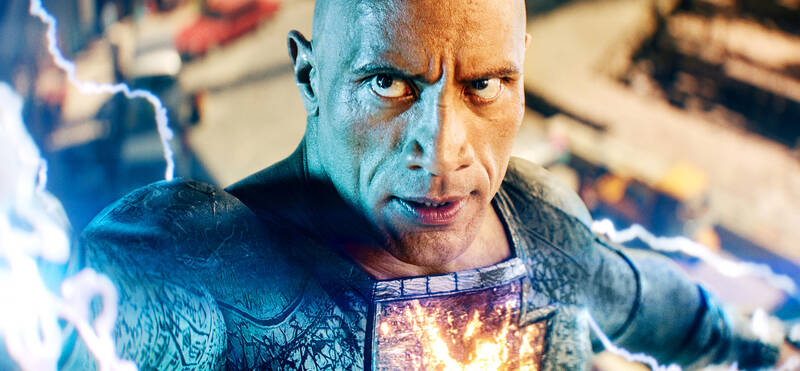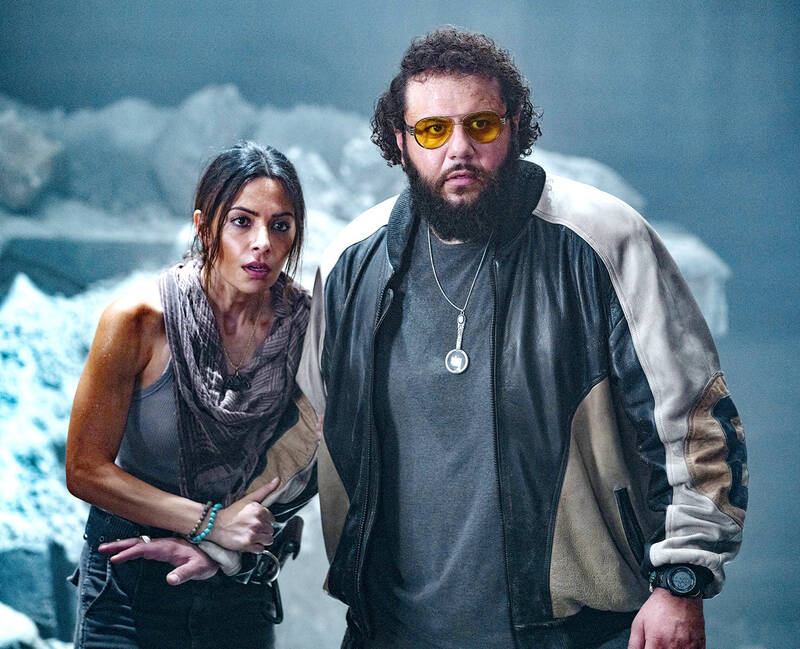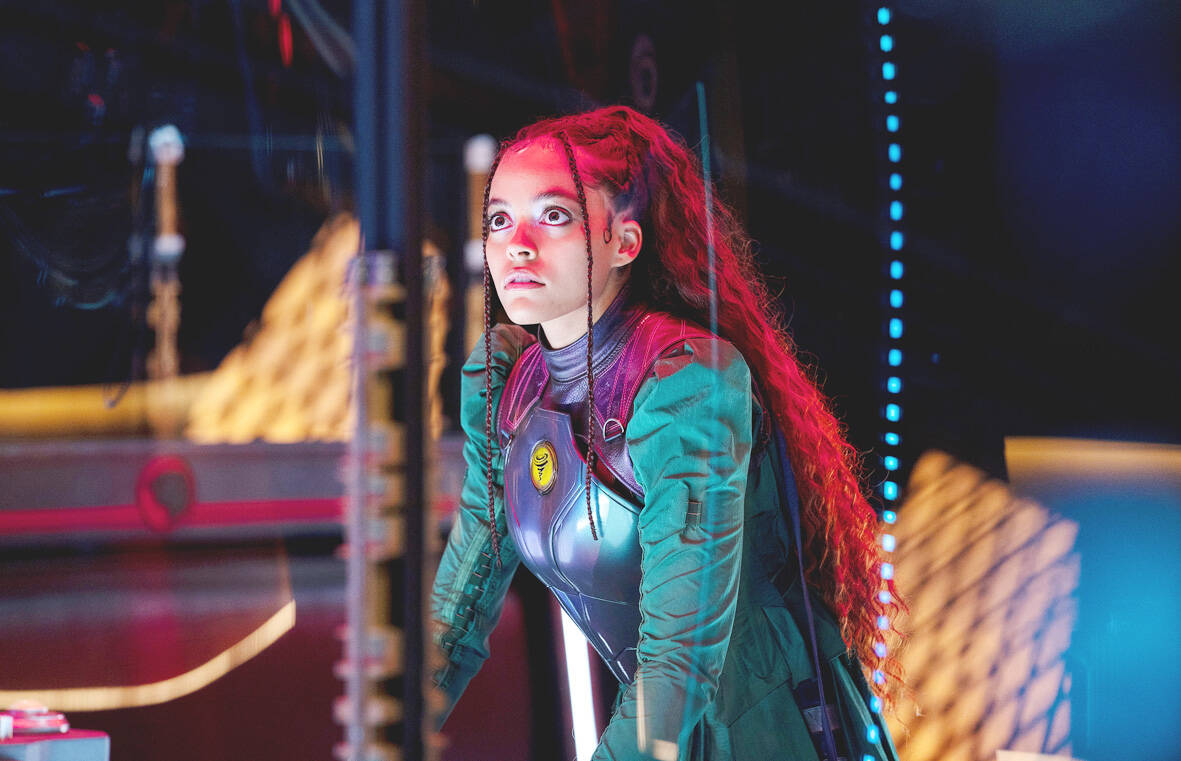Not long into Black Adam, a preteen boy looks up at the muscled hulk of Dwayne Johnson and begs for his help: “We could use a superhero right now.” Speak for yourself, kid.
Do we need another superhero with another convoluted origin story that stretches back thousands of years and fulfills a whacko destiny? Do we really need another clutch of secondary level heroes to muddy focus? We’re almost 40 deep into the Marvel Cinematic Universe and a dozen in the DC universe. You can almost smell the fumes now, can’t you?
Black Adam isn’t bad, it’s just predictable and color-by-numbers, stealing from other films like an intellectual property super-villain. But Johnson is a natural in the title role, mixing might with humor and able to deliver those necessary wooden lines. Why he hasn’t had a starring role in a DC or Marvel superhero flick until now is astonishing — c’mon, he’s built himself into a freaking superhero in street clothes already.

Photo: AP
Like Marvel’s Eternals, Black Adam gets out of the blocks very sluggishly with the tangled tale of our setting — Kahndaq, a fictional Middle Eastern kingdom in 2,600 BC that has wizards, a blood-thirsty king, a magical crown and Eternium, a rare metallic ore with energy-manipulating properties (Hello, Vibranium from Black Panther).
Flash-forward to present day, where Kahndaq is under the cruel rule of the organized crime syndicate Intergang and its citizens are ripe to rebel. They think they may have a leader in Black Adam (here Teth Adam, when he is introduced), who is released from his 5,000-year-long tomb and is naturally cranky. Is he a force for good or bad? (Or for a new sub-franchise?) The answer is yes to all.
Yet the other superheroes in the DC pantheon aren’t sure about the new guy and send what can only be described as the Plan B of muscle from leftover members of a knock-off organization called the Justice Society of America.

Photo: AP
There’s Doctor Fate (a dollar-store Doctor Strange played by Pierce Brosnan, who somehow keeps his dignity), Atom Smasher (Noah Centineo, nicely playing a dweeby and always hungry giant), Aldis Hodge as a one-note Hawkman and Quintessa Swindell as Cyclone, who can control — checks notes — the wind. They apparently left at home the superhero with the ability to open jars.
Black Adam is more than a match for all of them combined. He can fly, move as fast as The Flash, catch rockets, deflect bullets and harness his own bluish electricity. Mostly he does this weirdly passive thing of just floating. “I kneel before no one” he intones, which might explain it.
Director Jaume Collet-Serra and the design team do a great job in every department but are let down by a derivative and baggy screenplay by Adam Sztykiel, Rory Haines and Sohrab Noshirvani that goes from one violent scene to another like a video game in order to paper over a plot both undercooked and overcooked. At one point, with the audience exhausted by all the carnage, they introduce skeletons who rise up as a legion from hell, just what we wanted.

Photo: AP
They nicely include pockets of humor that DC has not always done well — a recurring bit with Baby Come Back and teaching Black Adam satire are fun; a Clint Eastwood gag fails — and there may have been three natural endings piling up before the final, manipulative one. (“This can only end one way,” says the script. Don’t believe it.)
Amidst the punching superheroes are two humans — a rebel leader and her skateboard-and-comics-loving pre-teen son, played superbly by Sarah Shahi and Bodhi Sabongui, respectively. Comedian Mohammed Amer is a much-needed bolt of bright humor.
Most intriguing — and the angle most fruitful to lean into — is the notion of hero itself. The Justice Society members are shocked to find that they aren’t seen as heroic to the residents of Kahndaq, living 27 years under oppression. Black Adam has come to help, even if he’s a little more violent. Residents wonder where were the guys with all the superpowers for almost three decades while they suffered — a nice dig at Western nations.
“There are only heroes and villains. Heroes don’t kill people,” a confused Hawkman states. Black Adam replies: “Well, I do.” It is Shahiby’s character who notes that it’s easy to call someone a hero when you’re the one drawing the line.
The number of — ahem — call-backs to other films is pretty sad — Tomb Raider, Back to the Future and plenty of Star Wars (even, unforgivably, the line “You’re our only hope.”) It’s a film that is sometimes self-aware, as when the kid urges Black Adam to come up with a catchphrase that will sell lunchboxes.
He does, but it makes little sense: “Tell them, ‘The man in black sent you.’” Wait, he was sent by someone else? Do they mean Johnny Cash? Actually that may be a clue. What the filmmakers probably had in mind was cash — selling those lunchboxes.

June 9 to June 15 A photo of two men riding trendy high-wheel Penny-Farthing bicycles past a Qing Dynasty gate aptly captures the essence of Taipei in 1897 — a newly colonized city on the cusp of great change. The Japanese began making significant modifications to the cityscape in 1899, tearing down Qing-era structures, widening boulevards and installing Western-style infrastructure and buildings. The photographer, Minosuke Imamura, only spent a year in Taiwan as a cartographer for the governor-general’s office, but he left behind a treasure trove of 130 images showing life at the onset of Japanese rule, spanning July 1897 to

One of the most important gripes that Taiwanese have about the Democratic Progressive Party (DPP) is that it has failed to deliver concretely on higher wages, housing prices and other bread-and-butter issues. The parallel complaint is that the DPP cares only about glamor issues, such as removing markers of Chinese Nationalist Party (KMT) colonialism by renaming them, or what the KMT codes as “de-Sinification.” Once again, as a critical election looms, the DPP is presenting evidence for that charge. The KMT was quick to jump on the recent proposal of the Ministry of the Interior (MOI) to rename roads that symbolize

On the evening of June 1, Control Yuan Secretary-General Lee Chun-yi (李俊俋) apologized and resigned in disgrace. His crime was instructing his driver to use a Control Yuan vehicle to transport his dog to a pet grooming salon. The Control Yuan is the government branch that investigates, audits and impeaches government officials for, among other things, misuse of government funds, so his misuse of a government vehicle was highly inappropriate. If this story were told to anyone living in the golden era of swaggering gangsters, flashy nouveau riche businessmen, and corrupt “black gold” politics of the 1980s and 1990s, they would have laughed.

It was just before 6am on a sunny November morning and I could hardly contain my excitement as I arrived at the wharf where I would catch the boat to one of Penghu’s most difficult-to-access islands, a trip that had been on my list for nearly a decade. Little did I know, my dream would soon be crushed. Unsure about which boat was heading to Huayu (花嶼), I found someone who appeared to be a local and asked if this was the right place to wait. “Oh, the boat to Huayu’s been canceled today,” she told me. I couldn’t believe my ears. Surely,